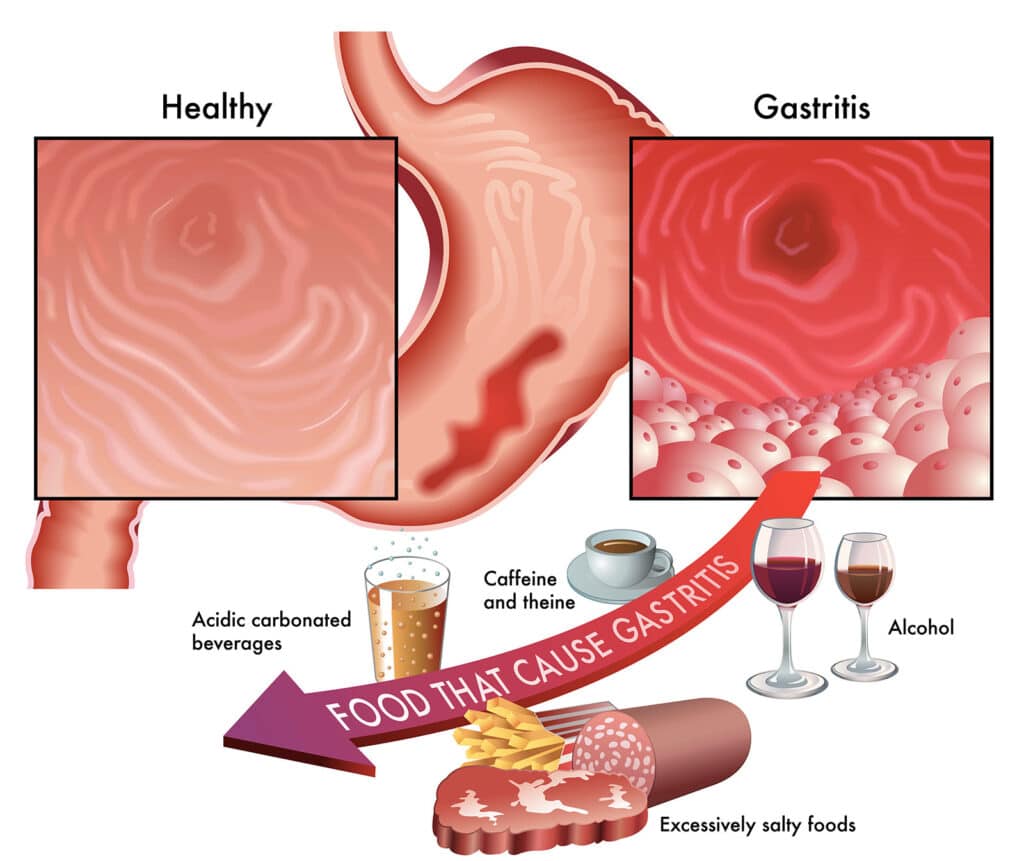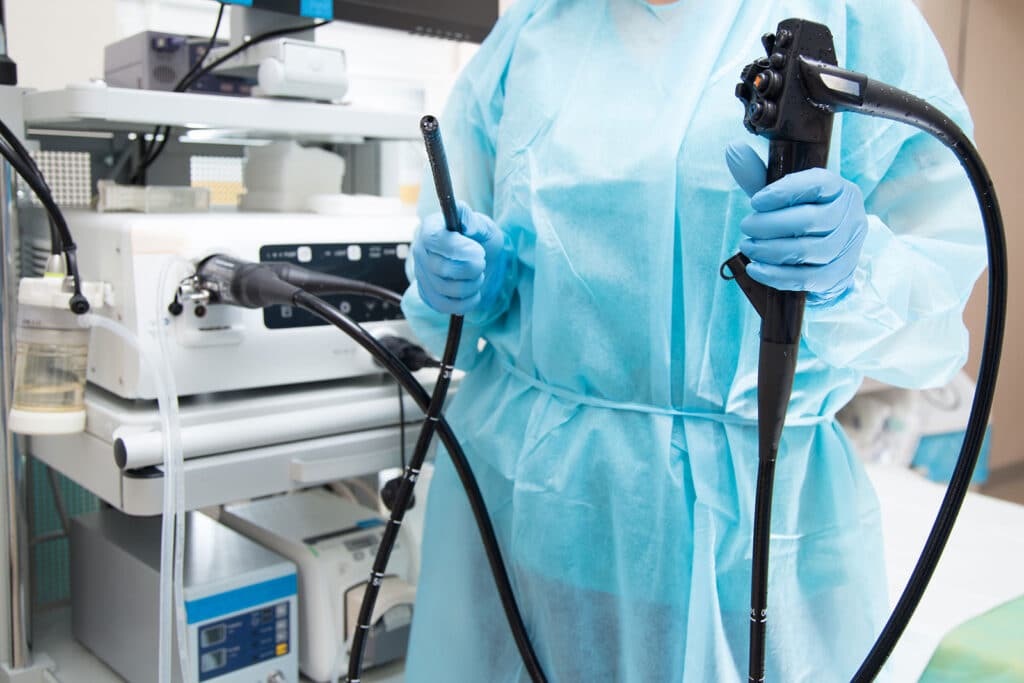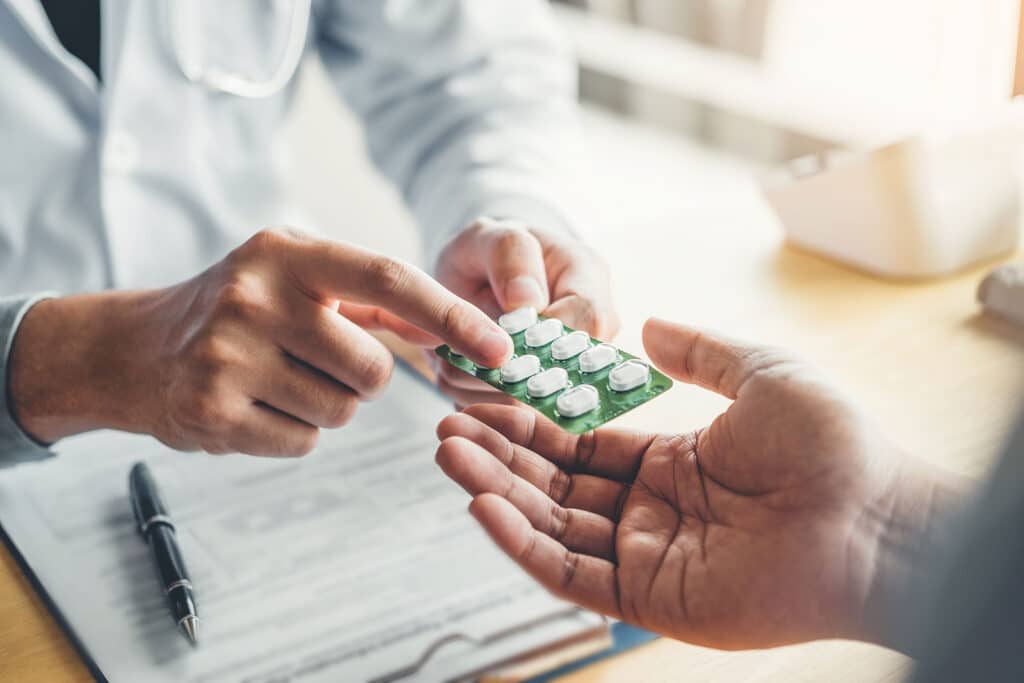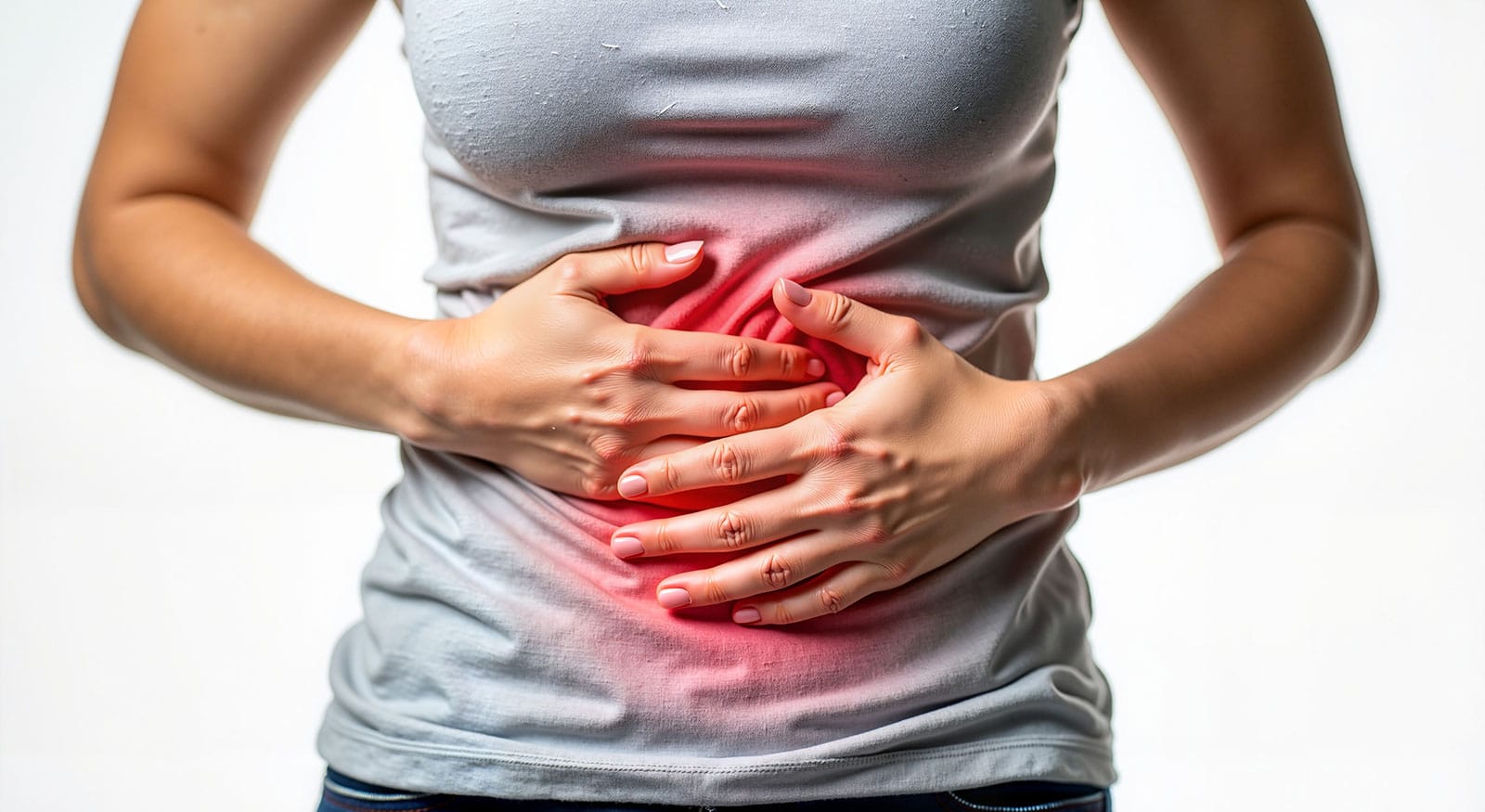Recovering from alcoholic gastritis can be a lengthy and challenging process. Understandably, it’s difficult for people struggling with alcohol use disorder. Yet, if you leave it untreated, you may develop peptic ulcers and gastric cancer.
It sounds worrying, but the good news is that you can heal from alcoholic gastritis with the proper help. Today, we’ll go through everything you should know about alcoholic gastritis recovery time and treatment!
Table of Contents
- What Is Alcoholic Gastritis?
- What Is the Alcoholic Gastritis Recovery Time?
- What Are the Symptoms of Alcoholic Gastritis?
- How Common Is Alcoholic Gastritis?
- How Is Alcoholic Gastritis Diagnosed?
- How Do You Treat Alcoholic Gastritis?
- Does Alcohol–Induced Gastritis Go Away By Itself?
- Can Smoking Trigger Alcoholic Gastritis?
- Long Island Treatment Center’s Alcohol Addiction Program
- Conclusion
What Is Alcoholic Gastritis?
Alcoholic gastritis is a condition that develops in people with excessive alcohol consumption. It’s an inflammation of the stomach lining due to alcohol use.
Alcoholic beverages contain ethanol, which irritates your stomach lining. As a result, your stomach produces more acid than usual.
This, combined with toxic acetaldehyde from the alcohol, causes gastritis in the stomach lining.
People with alcoholic gastritis may feel stomach pain. The pain is stronger after drinking alcohol, smoking, and eating spicy food.
Over time, alcohol-induced gastritis leads to serious complications like gastrointestinal bleeding.

The Two Types of Alcoholic Gastritis
There are two types of alcoholic gastritis you should be aware of.
1. Acute Gastritis
Acute gastritis is a sudden but temporary inflammation in the gastrointestinal tract. It’s often triggered by heavy drinking, and it resolves after you address the cause.
2. Chronic Gastritis
Chronic gastritis develops over time through prolonged alcohol use. Your mucosa is constantly inflamed, which can lead to thinning of the stomach lining.
Unfortunately, it’s hard to tell whether you have chronic gastritis, as there are no symptoms in some cases.
The Long-Term Effects of Alcoholic Gastritis
If you leave alcoholic gastritis untreated, it can become life-threatening. Prolonged gastritis develops into anemia, stomach ulcers, and stomach cancer.
Moreover, your symptoms will worsen if you smoke or take NSAIDs like aspirin and ibuprofen.
You may need surgery to treat these issues, which is why it’s important to address alcoholic gastritis early.
What Is the Alcoholic Gastritis Recovery Time?
The recovery time for alcoholic gastritis varies depending on how damaged your digestive system is.
Acute gastritis may resolve within a few days. However, if you have an H. pylori infection with acute gastritis, you can be on antibiotics for up to two weeks.
On the other hand, chronic gastritis has a longer recovery time depending on your health condition. Larger stomach ulcers can take up to three months to heal.
Of course, to recover from alcoholic gastritis, you should also stop heavy drinking. Otherwise, your stomach lining will continue to be damaged.

What Are the Symptoms of Alcoholic Gastritis?
Alcoholic gastritis doesn’t always show symptoms, which is why it can become dangerous. In most cases, you’ll only feel a slight discomfort in your upper abdomen. You may feel a burning sensation, and you may mistake it for indigestion.
For more severe gastritis, these are the common symptoms:
- Bloating or feeling full even though you haven’t eaten
- Loss of appetite
- Acid reflux and heartburn as stomach acid flows through your esophagus
- Abdominal pain
- Frequent hiccups
- Nausea and vomiting
- Fatigue, weakness, and shortness of breath
Note that the severity of these symptoms depends on your health condition. The longer you continue alcohol consumption, the higher your risk of developing ulcers.
You should seek help from doctors if you’re experiencing severe pain or having difficulty keeping food down!
How Common Is Alcoholic Gastritis?
Alcohol gastritis is extremely common among people with alcohol use disorder.
One study shows that varying degrees of gastritis are present among all patients who chronically drink alcohol.
To add to this, 13 out of 14 people who have been chronically drinking alcohol for more than 10 years have atrophic gastritis. This is a type of chronic gastritis where the stomach lining thins and loses acid-producing cells.
So, if you’re struggling with your alcohol consumption, it’s vital to get yourself checked by a doctor.

How Is Alcoholic Gastritis Diagnosed?
To diagnose alcoholic gastritis, these are tests your healthcare provider may conduct.
1. Breath Testing
You may undergo breath tests to identify whether you have H. pylori bacteria in your stomach.
2. GI X-Rays
An X-ray of your upper digestive system may show signs of an ulcer. During this test, you’ll swallow a metallic liquid that can coat your digestive tract for better visibility.
3. Upper Endoscopy
Endoscopy is a test where doctors pass a camera down your throat and into your stomach and small intestine. This allows them to see whether there is inflammation in your stomach.
In some cases, doctors may also take a sample from your stomach lining to test for H. pylori.
4. Blood and Stool Tests
Blood tests can identify whether you have anemia due to excessive bleeding in your stomach. On top of this, stool tests can detect blood in your feces, which is a sign of gastritis.

How Do You Treat Alcoholic Gastritis?
Gastritis treatment involves a holistic approach to treat any symptoms you may have. Below are a few ways to address alcoholic gastritis.
1. Medication
Doctors may give you over-the-counter medication for treating alcoholic gastritis.
Antacids like Pepto-Bismol can neutralize your stomach acid. H2 blockers and proton pump inhibitors like Pepcid can reduce stomach acid production.
Additionally, if you have an infection, you’ll receive an antibiotic prescription.
2. Lifestyle Changes
You can also heal from alcoholic gastritis by following certain lifestyle changes.
First, you should limit your alcohol consumption. Avoid eating oily, acidic, and spicy food. It helps to eat small meals more frequently.
Smoking and certain medications can also trigger gastritis, so it’s best to avoid them.
Finally, be sure to reduce your stress and sleep on time. Less stress is key to reducing your stomach acid production!
3. Surgery
In rare cases, people with alcoholic gastritis may need surgery to fix gastrointestinal bleeding and bile reflux.
Does Alcohol–Induced Gastritis Go Away By Itself?
Acute alcoholic gastritis will go away in a few days once you stop alcohol consumption. If you have an infection, the inflammation will clear once that’s resolved.
On the other hand, chronic alcoholic gastritis will need treatment before it goes away. Since the damage is deep in this type of gastritis, a long healing period is necessary.
Can Smoking Trigger Alcoholic Gastritis?
Yes. Smoking can irritate your stomach lining and worsen symptoms of alcoholic gastritis.
Research shows that both alcohol and smoking have close ties to stomach ulcers. Moreover, cigarette smoking increases your risk of ulcer relapses.
Therefore, treating alcoholic gastritis means you have to limit both smoking and drinking alcohol!

Long Island Treatment Center’s Alcohol Addiction Program
If you or a loved one need alcohol addiction treatment, we’re here for you. Long Island Treatment Center can guide you through the healing process and help you make lifestyle changes.
We understand how difficult it is to lessen your alcohol intake. Fortunately, you can choose which treatment options will work best for you.
To give you an idea, here’s a general treatment plan for alcohol rehab.
1. Detox
Detoxification is a difficult part of recovery because this is when withdrawal symptoms occur. You may need supervision from doctors to manage the symptoms.
Here’s how you do it.
- Inpatient Treatment: Inpatient treatment is when you stay full-time at our facility and receive 24/7 medical help. Our facility lets you recover in comfort without having to travel out of state.
- Partial Hospitalization: Partial hospitalization is a less costly treatment option that most insurance providers cover. Here, you gain access to professionals who can teach you how to cope with alcohol addiction.
2. Counseling
Counseling and behavioral therapy allow you to heal after flushing the alcohol out of your system. We’ll give you a safe space to discuss issues and support you through therapy.
- Individual and Group Therapy: Therapy relieves emotional distress and gives you space to address any mental health problems. You can attend solo sessions or get support from a group setting.
- Outpatient Treatment: During outpatient treatment, you’ll attend sessions in the morning and return to your home at night. It’s best for those with a safe living situation and a strong support system.
3. Maintenance
After counseling, you start rebuilding your life and reintegrate into society. In some cases, you may even get housing and job opportunities from the center to make the transition easy.
- Aftercare Programs: Aftercare programs may involve counseling and vocational training. It reinforces the skills you’ve learned through counseling and lessens your chances of a relapse.
- Alumni Programs: Alumni programs give you access to a network of individuals with the same experiences. Yearly meetings and events ensure you receive support and have ongoing accountability.
Conclusion
Recovering from alcoholic gastritis can be challenging. Yet, you can regain your health with professional help. The recovery period will depend on your health condition.
Acute gastritis can heal within a few days to two weeks with an infection. Meanwhile, chronic gastritis can take months to heal.
Regardless of recovery time, what’s important is starting treatment as soon as possible.
Should you need help with limiting your alcohol intake, consider reaching out to Long Island Treatment Center. We’re here to give you a safe and supportive environment as you tackle substance abuse.


